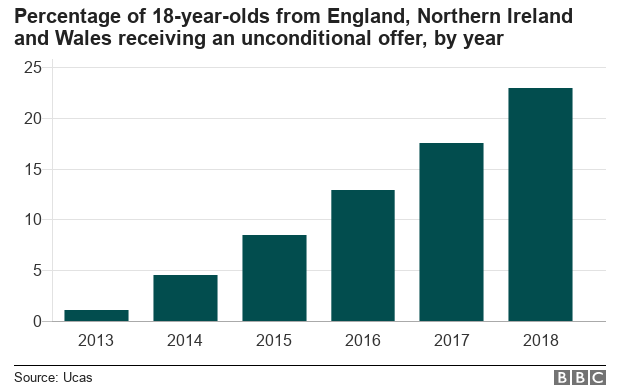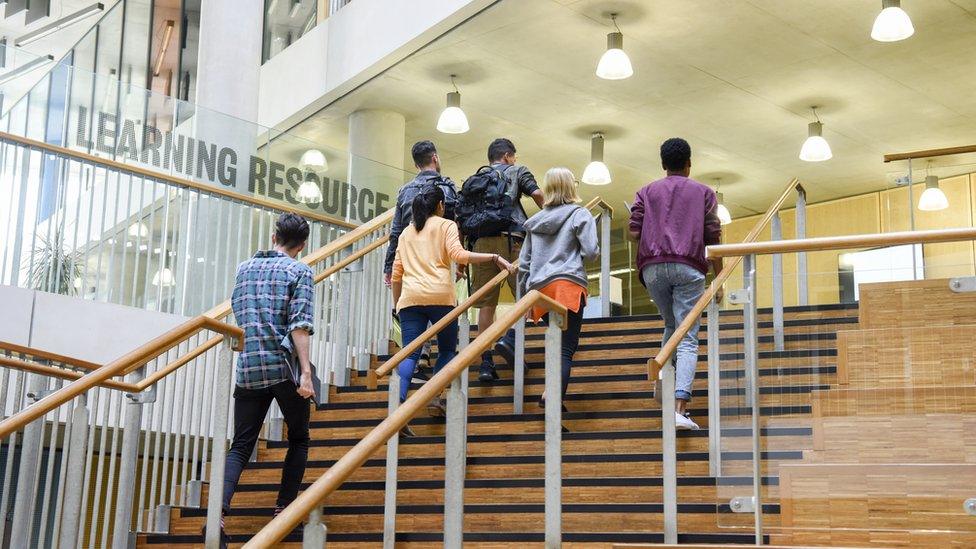Huge rise in unconditional university offers for students
- Published
- comments

There has been a huge rise in the number of unconditional offers being made to students for university places, admissions service Ucas says.
The total made to 18-year-olds from England, Northern Ireland, and Wales has risen by 65,930 over the past five years - from 2,985 in 2013 to 67,915 in 2018.
This means nearly a quarter (23%) of applicants received such an offer.
The government said the figures pointed to a "bums on seats" mentality.
And unions said the situation risked encouraging teenagers not to strive for the best A-level results possible.
What do the figures show?
By the end of June this year, Ucas figures show there were 254,700 18-year-olds from England, Northern Ireland and Wales applying to university.
Some of these students will have received offers from all five universities they applied to, while others may have had fewer.
Of all the offers received, 7.1% were unconditional, meaning a degree course place is secured regardless of the grades they achieve.
It is the first time that Ucas has analysed offer-making patterns during an application cycle,
While the admissions service does not give any reason for the rise in unconditional offers, it says its analysis is part of its ongoing commitments to "ensure transparency throughout the admissions process".
The data comes as the cap on the number of students a university can admit has been lifted and the population of 18-year-olds is falling.
Students now pay as much as £9,250 a year in tuition fees.
How have universities responded?
Alistair Jarvis, chief executive of Universities UK, said: "While there has been a steady growth in the number of unconditional offers made, they still account for a small proportion (7.1%) of all offers made by universities.
"Unconditional offers, when used appropriately, can help students and ensure that universities are able to respond flexibly to the range of applicants seeking places.
"Universities UK will continue to work with Ucas to monitor trends and any impact unconditional offer-making might have on student attainment.
"It is simply not in the interests of universities to take students without the potential to succeed."
What does the government say?
Universities Minister Sam Gyimah is not impressed by the figures.
"The rise in unconditional offers is completely irresponsible to students, and universities must start taking a lead, by limiting the number they offer," he said.

"Places at universities should only be offered to those who will benefit from them, and giving out unconditional offers just to put 'bums on seats' undermines the credibility of the university system.
"Along with the Office for Students, I am closely monitoring the number being issued and fully expect the regulator to take appropriate action.
"Unconditional offers risk distracting students from the final year of their schooling, and swaying their decisions does them a disservice - universities must act in the interest of students, not in filling spaces."
How have the unions responded?
General secretary Geoff Barton, general secretary of the Association of School and College Leaders (ASCL) said: "This huge increase in unconditional offers is driven by competition between universities and is not in the best interests of students.
"It can lead to students making less effort in their A-levels because their place is assured.
"That can then hamper their job prospects later down the line if potential employers take into account their A-level grades."
ASCL also expressed concerns that the move would disadvantage students who are the first in their family to go to university.
"First generation university applicants may well be more attracted to an unconditional offer than those who have the expertise and advice of their parents or school to ensure it's the appropriate course for them, with good career potential."

The University and College Union said unconditional offers made a mockery of exams and put students "under enormous pressure to make snap decisions about their future".
UCU general secretary Sally Hunt said: "The proliferation of unconditional offers is detrimental to the interests of students and it is time the UK joined the rest of the world in basing university offers on actual achievements instead of on guesswork."

'My unconditional place made me work harder'
Olivia Harris, 18, has received an unconditional offer from her university and believes it may have pushed her to work harder.
"When I got an email from the university I really wanted to go to with the offer, I actually fell off the seat on the bus I was so happy.

Olivia says she can plan ahead
"Not only so happy and proud that they thought I was a good enough candidate, but also a tiny bit of relief to know I had the offer.
"I think some people use it and think: 'Oh I don't have to work hard', but I think it may have pushed me more than not having it.
"I wanted to prove the point to people that I deserve it.
"In some ways it's a slight relief, when it comes to results day I won't be panicking thinking I've not got into university.
"It means I've already got my stuff prepared for where I want to go. I can plan ahead for when I start, otherwise I'd be waiting until the end of August to know if I get to go to university."

What is an unconditional offer?
When universities make an offer to prospective students, the offer can either be conditional or unconditional.
A conditional offer usually specifies the grades a student needs to achieve in their A-levels, BTecs, or any other relevant qualification, before they are fully accepted on to a course.
Unconditional offers do not have any further academic requirements the student needs to meet - in other words, the place is guaranteed before exams are even taken.
Ucas says they have, traditionally, been offered to:
mature students who have already achieved their qualifications
those applying for creative arts courses, after submitting a portfolio, or following a successful audition
reduce the stress some students may feel during the exam period
attract and retain interest from students in a competitive marketplace
What advice does Ucas offer students?
Ucas director of external relations, Helen Thorne, said students should take the time to carefully think about all their options fully before accepting an unconditional offer.
"While unconditional offers are made for a number of reasons, we believe that universities should always emphasise to students the importance of completing their studies to the best of their abilities.
"Later this year, we'll be publishing more detailed analysis of offer-making, including any impact on students' attainment."
What about students in Scotland?
The figures do not include students from Scotland.
Ucas said: "In Scotland, a substantial proportion of students aged 18 who apply through Ucas undergraduate, have already attained SQA Highers and met the academic requirements to enter higher education.
"Therefore, students from Scotland are not included in this analysis."